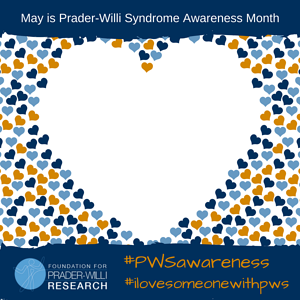May is Prader Willi Syndrome Awareness Month
Prader-Willi syndrome (PWS) is a rare genetic disorder affecting approximately 1 in 15,000 people—males and females equally, from all races and ethnicities. PWS is a life-threatening medical disorder caused by loss of active genetic material on chromosome 15. This affects:
- Hormones
- Muscle strength
- Appetite
- Behavior
- Cognition and learning
- Temperature regulation
- Pain tolerance
- Sleep patterns
Nearly every system in the body is impacted by a PWS diagnosis, but the hallmark symptom is hyperphagia, or continuous, extreme hunger. A person with PWS never feels full. Exacerbating this problem, those with PWS have a slow metabolism and need only a fraction of the calories of their typical peers. The result is easy weight gain. PWS is recognized as the leading genetic cause of life-threatening obesity in children.
To reduce the risk of obesity, it’s important for children with PWS to be taught the importance of adopting a healthy lifestyle early in life. The prevention and management of obesity is dependent on a combination of:
- a sensible diet (energy intake)
- the modification of eating behaviors (to ensure children adhere to prescribed diet)
- an exercise plan (energy expenditure)
Playgrounds can play a key role in a home-based exercise program.
- Swings help with sense of balance.
- Climbing assists with concentration, coordination, balance, and problem-solving skills.
- Slides and water slides as they are not only fun, but require a lot of stair climbing to reach the top.
- Monkey bars to help build upper body strength.
- Youth fitness equipment can be used to develop exercise routines
Learn more about Prader Willi Syndrome and how you can get involved at the Foundation for Prader Willi Research
Sources:

